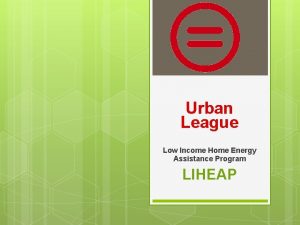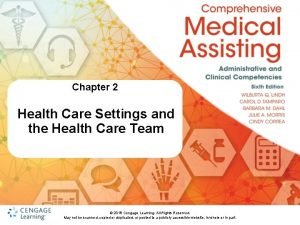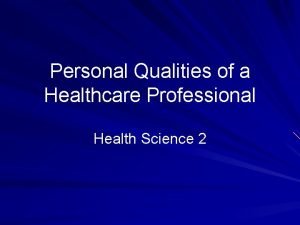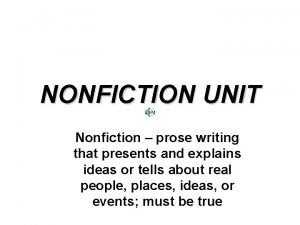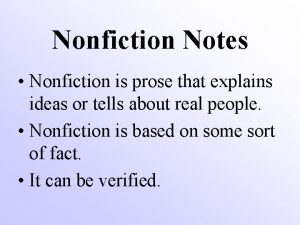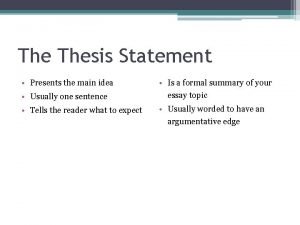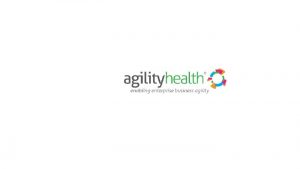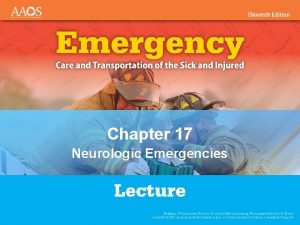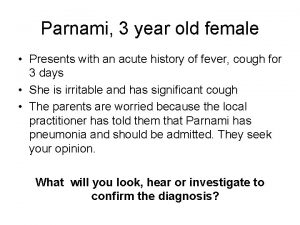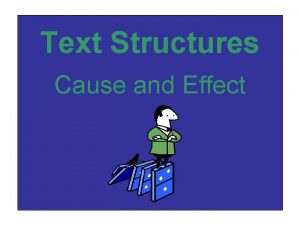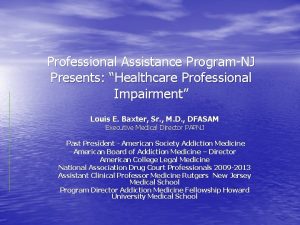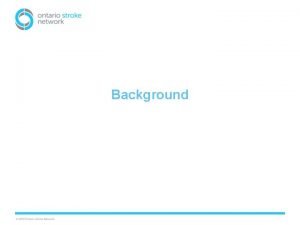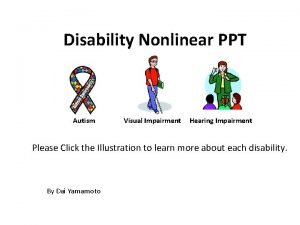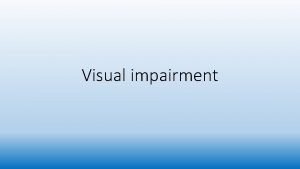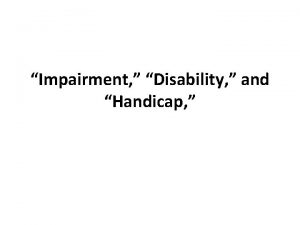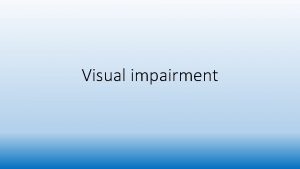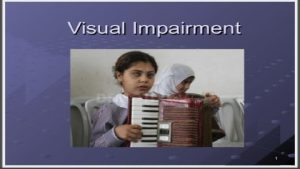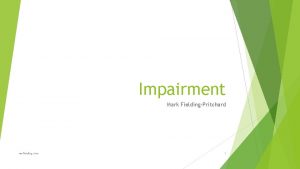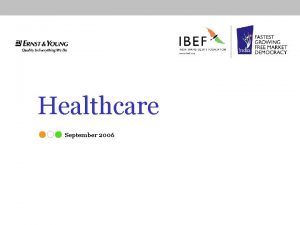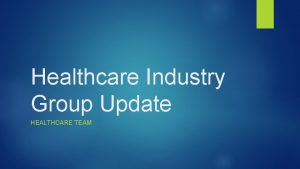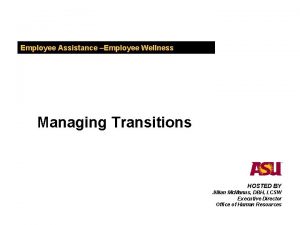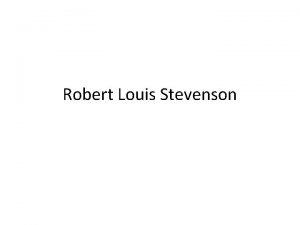Professional Assistance ProgramNJ Presents Healthcare Professional Impairment Louis




























- Slides: 28

Professional Assistance Program-NJ Presents: “Healthcare Professional Impairment” Louis E. Baxter, Sr. , M. D. , DFASAM Executive Medical Director PAPNJ Past President - American Society Addiction Medicine American Board of Addiction Medicine – Director American College Legal Medicine National Association Drug Court Professionals 2009 -2013 Assistant Clinical Professor Medicine Rutgers New Jersey Medical School Program Director Addiction Medicine Fellowship Howard University Medical School

Objectives • Attendees will learn about Healthcare • • • Professional Impairment How to Identify and Refer to Treatment Attendees will learn how impairing conditions are identified and treated Age Related Difficulties referred to PAP How treatment plans are developed Attendees will learn the “benefits” of enrollment in the Program

HISTORICAL DATA • 1974 … AMA Council On Behavioral Health • • Published “The Sick Physician” Recommended The Development Of Committees And Programs To Address The Issue Recommended Legislation To Treat Rather Than to Punish The Sick Physician JCAHO MANDATE. . . 1/1/01 JCAHO MANDATE … 2/1/04

THE PROGRAM • Established as the PHP-MSNJ in 1982; now PAPNJ … 1 st Full time Program in US • “Voluntary” Participants • Evaluations; Treatment; Monitoring; & Advocacy; • • • “Hospital Authorized Party” All Diseases/Disorders of Impairment Education and Prevention Programs NATIONAL REPUTATION PAP Counseling Services clients and family Buprenorphine Therapy

PROGRAM MISSION • To Provide A Means To Identify, Evaluate, And Treat Healthcare Professionals Who May Have DISEASES OF IMPAIRMENT • To Protect The Public Safety • To Provide Expert Monitoring • To Document Recovery • De-Stigmatize Diseases Of Impairment

DISORDERS OF IMPAIRMENT • • • Alcohol Use Disorders Drug Use Disorders Psychiatric Disorders Disruptive Disorders Psychosexual Disorders Metabolic Disorders Physical Disorders Aging Difficulties Psychological Difficulties Litigation and other Stress Management Physician “Burn-out”

REFERRAL SOURCES • Colleagues • Office Staff Personnel • Residency Program Directors • Professional School Deans • Hospital JCAHO Committees • Family Members • State Licensing Boards (SBME) • Attorney General’s Office • Out Of State Physician Health Programs’

Behavioral Indicators of Professional Impairment • • • Lies Academic dishonesty Refuses counseling when recommended Touches clients inappropriately Inappropriate boundaries Displays anger against specific gender, race, sexual orientation Misrepresents his or her skill level Sexually harasses clients / others Deficient interpersonal skills Difficulty receiving supervision Disruptive or dominating

Clinical Signs and Symptoms of Co-Worker Impairment • • • Strong Odor of alcohol or mouthwash, mints Hand tremors in the AM Excessive perspiration Sleeping or dozing off while at work Frequent absenteeism without notice; lateness Unexplained disappearances from work Confusion and memory loss Frequent bathroom breaks Volunteering for overtime or being at work unexpectedly Heavy drug wastes and or shortages Poor record keeping and medication errors

AGE RELATED IMPAIRMENTS • Cognitive Impairment …metabolic, organic, • • • medication? Cerebral Vascular Accidents … motor, speech, cognitive Longstanding Metabolic Effects …hypertension, diabetes Depression … spousal death, retirement, financial worries Dementia … all causes Physical Disability

Definition of Disruptive Behavior • Disruptive behavior includes, but is not limited to, words or actions that: – Prevent or interfere w/an individual’s or group’s work, academic performance, or ability to achieve intended outcomes (e. g. intentionally ignoring questions or not returning phone calls or pages related to matters involving patient care, or publicly criticizing other members of the team or the institution); – Create, or have the potential to create, an intimidating, hostile, offensive, or potentially unsafe work or academic environment (e. g. verbal abuse, sexual or other harassment, threatening or intimidating words, or words reasonably interpreted as threatening or intimidating); – Threaten personal or group safety, such as aggressive or violent physical actions; 11 – Vanderbilt Violate. University Institution’s Physician Policy and Medical Disruptive Center Policy #HR-027, 2010

THE PROCESS • Initial Interview - “Face - To - Face” • Review Of Referral Information • Alcohol And Drug Use History • Previous Drug And Alcohol Treatment History • Psychiatric History • Past Medical History

THE PROCESS • Legal History • Family History • Review All Pertinent Data • Psychiatric Evaluation • Comprehensive Medical Examination • Neuropsychological Evaluation • Random Urine Test

DIAGNOSIS • Compilation Of All The Data • DSM-V Criteria For Substance Use • DSM-V Criteria For Psychiatric Disorders • Laboratory Test Results For Metabolic Disorders • Results Of Psychometric Testing • Psychosexual Evaluations (p. r. n. )

TREATMENT PLANNING • Selection Of Level Of Care … ASAM Criteria (ASAM-PPC 2) • Referral To Appropriate Therapist (Experience with Healthcare Professionals) • Monthly “Face To Face” Visits • Random Urine Testing • Provider Treatment Progress Reports • Quarterly Reports to referral source

TREATMENT WORKS • Full Treatment Experience (Detoxification; Rehabilitation; Maintenance) • General Population recovers @ 77% @ 1 yr • Physicians Recover @ 92 % @ 1 yr • Detoxification & Rehab Only @ 33% @ 1 yr • Detoxification Alone @ < 10% @ 1 yr

Treatment Outcome Comparisons • Alcoholism … 50 -70% abstinent • Opioid Dependence … 50 -80% abstinent • Cocaine Dependence … 50 -60% abstinent • Nicotine Dependence … 20 -40% abstinent • Diabetes (relapse) … 30 -50% stable • Hypertension (poor control) … 50 -60% • Asthma (multiple ER visits) … 60 -80% (Gaber, Davidson, 1992; Mc. Lellan 2002)

IMPAIRMENT REVIEW COMMITTEE • Established By Regulations 1994 • A Committee Of The SBME • 5 Voting Members : 2 State Board of Medical Examiners; 2 PAPNJ; 1 Commissioner Appointee • Reviews Each PAP Case By Code Number • Enrolls Appropriate Cases Into ARP

ALTERNATE RESOLUTION PROGRAM • Allows For The Monitoring Of Physicians Without Formal Administrative Action • Allows For Continued Monitoring Of Physicians In Recovery From Diseases Of Impairment • Provides Opportunities For Physicians To Anonymously Seek Help For Their Illnesses Without Punishment

ALTERNATE RESOLUTION PROGRAM • Initial Reports And Follow Up Reports • Revision Of Treatment Plans As Per Impairment Review Committee • Discharge Or Release From Program After Five Years • Allows For “No” Answers On Biennial License Renewal Applications

IMMEDIATE REPORT OF RELAPSE

Addiction Treatment Terminology • DSM-V & DSM-IV Diagnosing for Psychiatric and • • • Substance Use Disorders “Dependence / Addiction” (3 or more criteria) “Abuse” ( less than 3 criteria) “Use Disorder” ( no criteria are met for required previous 12 month period) “Slip” indicates short period of use; no patient endangerment; no return to previous level of use “Relapse” indicates a return to previous use pattern; prolonged period of time; risk of patient harm; noncompliant with recommendations • “Use” does not equal “impairment”

SUMMARY • Professional Assistance Program (PAP) … 1982 • • as PHP Treatment Works Impairment Review Committee (IRC) Alternate Resolution Program (ARP) Treatment And Advocacy While Protecting The Public Safety “ Hospital Authorized Party” JCAHO Buprenorphine Induction Program 609 -919 -1660

Post Presentation Examination-1 • Healthcare impairment is caused by: • A. Availability of prescription pads • B. Sensitivity to alcohol and drugs • C. Non-supportive spouses significant others • D. Genetic and environmental stressors • Patient responsibility overload • Correct answer is D.

Post Presentation Examination-2 • Reporting colleagues is risky because: • A. Colleagues become liable for suits • B. Doctor patient relationship supersedes • C. Reporting requires evidence • D. Reporting will destroy the colleague • E. Failure to report is law • Correct answer is E.

Post Presentation Examination - 3 • Reports to the PAP results in: • A. Immediate loss of license • B. Notification to the licensing board • C. Suspension from the Medical Staff • D. Satisfies the duty to report • E. Referral into residential treatment • Correct answer is D.

Post Presentation Examination-4 • Enrollment in the PAP: • A. Allows the impaired professional to resume • • practice when cleared B. Will assure that the impaired professional will maintain their license C. Will give the licensee protection from accusers D. Will shield licensee from prosecution Correct answer is A.

Post Presentation Examination-5 • Substance Use Disorders and Psychiatric • • • Diagnoses are: A. Chronic and problematic B. Chronic and manageable C. Chronic and progressive D. Chronic and restrictive E. Chronic and destructive Correct answer is B.
 Urban league energy assistance
Urban league energy assistance Healthcare and the healthcare team chapter 2
Healthcare and the healthcare team chapter 2 Healthcare and the healthcare team chapter 2
Healthcare and the healthcare team chapter 2 Louis xvi louis vuitton
Louis xvi louis vuitton Unit 3 personal qualities of a healthcare worker
Unit 3 personal qualities of a healthcare worker Professional appearance in healthcare
Professional appearance in healthcare Prose writing that presents and explains ideas
Prose writing that presents and explains ideas Zids and zods answers
Zids and zods answers Presents from my aunt in pakistan
Presents from my aunt in pakistan Presents simple
Presents simple A tes pieds ô divin roi nous apportons nos présents
A tes pieds ô divin roi nous apportons nos présents 16 3 darwin presents his case answer key
16 3 darwin presents his case answer key What is tragedy
What is tragedy Prose writing that presents and explains ideas
Prose writing that presents and explains ideas Pear paragraph example
Pear paragraph example Which sentence presents a faulty either/or argument?
Which sentence presents a faulty either/or argument? Is the way an author presents a character.
Is the way an author presents a character. Thesis statement and main idea
Thesis statement and main idea Sats word problems
Sats word problems Structure of drama
Structure of drama Zids and zods
Zids and zods Which type of communication is shown in this poster
Which type of communication is shown in this poster Sally elatta presents on business agility
Sally elatta presents on business agility Chapter 17 neurologic emergencies
Chapter 17 neurologic emergencies A 26 year old female presents
A 26 year old female presents Discussion text
Discussion text The text presents
The text presents What is font
What is font Where does “snowflake girl” help to deliver presents?
Where does “snowflake girl” help to deliver presents?
